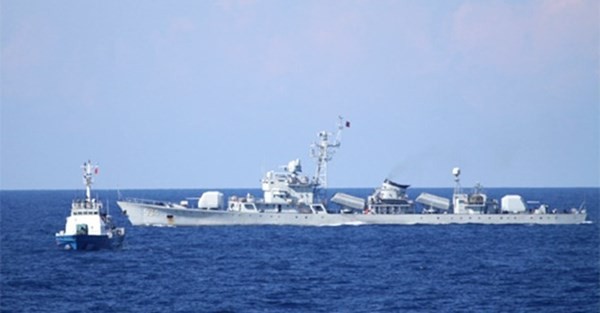(VOVworld) – China has illegally placed oil rig Haiyang 981 in Vietnam’s exclusive economic zone and continental shelf and perversely claimed sovereignty over Vietnam’s Hoang Sa archipelago. In a recent diplomatic note sent to the UN to circulate among UN agencies, Vietnam confirmed its sovereignty over Hoang Sa archipelago and said China has no legal or historical basis for claiming this archipelago.
 |
Chinese missile defense vessel near oil rig Haiyang 0981 (photo: Vietnam marine police force)
|
Vietnam’s Ministry of Foreign Affairs said the Socialist Republic of Vietnam rejects all Chinese claims of sovereignty over Vietnam’s Hoang Sa archipelago, which China calls Xisha, which the permanent delegation of the People’s Republic of China mentioned in documents and letters sent to the UN Secretary General on May 22, 2014 and June 6, 2014.
China’s claim of sovereignty is inconsistent with historical documents
The documents China provided do not prove that China established sovereignty over Hoang Sa archipelago when it was an ownerless territory. Historical documents show that China’s sovereignty has never included Hoang Sa. In the last decade of the 19th century, the ships Bellona and Umeji Maru sank near Hoang Sa and Chinese fishermen salvaged their cargos. China said Hoang Sa was a deserted territory and did not belong to China, so China had no responsibility for the looting of the cargos.
Vietnam established its sovereignty over the Hoang Sa archipelago while it was an ownerless land. In the 17th century, the Nguyen dynasty exploited resources on the islands of Hoang Sa, surveyed sea routes, and ensured security for foreign ships sailing near Hoang Sa. These activities were recorded and circulated in official documents of Vietnam’s feudal regimes. Vietnam has preserved these imperial archives until today.
After France and Vietnam signed the Protectorate Treaties on March 15, 1874, and June 6, 1884, France, on behalf of Vietnam, continued to exercise sovereignty over Hoang Sa and rejected any violations by China. France conducted various activities exercising its sovereignty over Hoang Sa, including building and operating a light house and a meteorological center, establishing administrative units of Thua Thien province, and issuing birth certificates for people born in the archipelago.
Vietnam’s sovereignty over Hoang Sa is recognized internationally
Before and after WWII, sovereignty over the Hoang Sa and Truong Sa archipelagos was considered at many international conferences. At the Cairo conference in 1943 and the Potsdam conference in 1945, Chinese representative Jiang Kai-shek did not mention China’s sovereignty over Hoang Sa and Truong Sa. At the San Francisco peace conference in 1951, 51 participating countries did not reject Vietnam’s declaration of its long-standing sovereignty over Hoang Sa and Truong Sa archipelagos presented by head of the Vietnamese delegation Tran Van Huu. The Geneva conference in 1954 to restore peace in Indochina affirmed that all parties respected Vietnam’s independence and territorial integrity including the Hoang Sa and Truong Sa archipelagos, which were managed by French and Vietnamese forces. China participated in the Geneva conference and clearly understood the situation.
China uses force to occupy the archipelago but can not claim sovereignty
China has twice invaded Vietnam’s Hoang Sa. In 1956, taking advantage of the situation after France withdrew from Vietnam, China invaded the estern part of Hoang Sa. The leaders of the Republic of Vietnam strongly denounced China’s occupation. In 1959, the Republic of Vietnam foiled a group of Chinese soldiers disguised as fishermen trying to land on the western part of Hoang Sa. In 1974, taking advantage of the war in Vietnam, China attacked and wrested control of Hoang Sa from the Republic of Vietnam. This was the first time China used force to invade all of Hoang Sa.
International law says occupying the territory of a sovereign nation is a violation and cannot be the foundation of claiming sovereignty. Vietnam retains its sovereignty over Hoang Sa and the fact is not changed by China using force to take it over.
Vietnam has never acknowledged China’s sovereignty over Hoang Sa
Vietnam’s Ministry of Foreign Affairs contends that China intentionally distorted history when it interpreted a diplomatic note written by Prime Minister Pham Van Dong in 1958 and curtain documents published in Vietnam before 1975. Prime Minister Dong’s diplomatic note only dealt with sea issues not land territory and did not mention sovereignty over Hoang Sa and Truong Sa. China’s arguments conflict with statements by Chinese leaders including leader Deng Xiaoping, who said in September, 1975, that Vietnam and China should resolve their differences through friendly consultation. China ought to respect history and negotiate with Vietnam on the Hoang Sa issue.